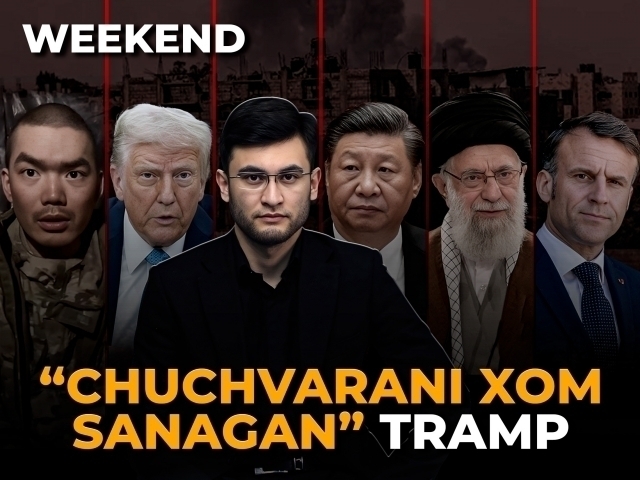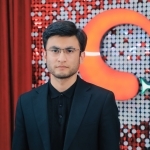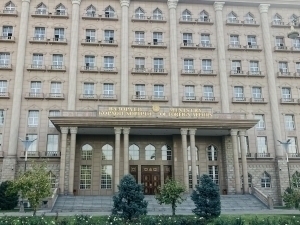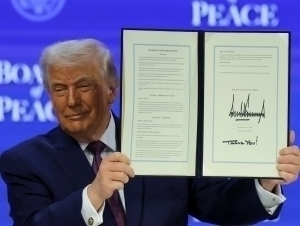Weekend: Good news from France to Palestine, the Chinese are partners in the Russian invasion
Review
−
13 April 2025 32302 13 minutes
While US President Donald Trump is gaining the support of some countries in the trade war he initiated, his main target remains China. Under Trump's leadership, the US continues to have strained relations with China.
Meanwhile, the cries of suffering in Gaza appear to have finally reached France—currently seen as Europe’s most prominent leader. French President Emmanuel Macron has expressed a desire to recognize Palestine as a state. If this is not merely a political tool aimed at countering the US, the move would certainly be a historic milestone for the Palestinian people.
Later in the week, a meeting was held to peacefully resolve the tensions between the US and Iran, a conflict that has worried the international community for the past ten days. Some positive outcomes from the meeting have already been reported.
A “new Trump” has emerged in Europe. Following a court ruling against Marine Le Pen—France’s long-time opposition leader—that barred her from running in the presidential election, the politician has drawn comparisons to Trump.
With that, the Weekend program by QALAMPIR.UZ begins, bringing you details of key global developments from the past week.
Trump, Who “Considered Dumplings Raw”
They say no one wins in a nuclear war. The same can be said for a trade war, where the main weapon is the imposition of tariffs. This type of conflict, initiated by Trump in February, has escalated far beyond expectations and now has the potential to reshape the global political order that has existed for decades. At the center of this conflict are two sides: the United States and, essentially, the rest of the world. This is what makes the situation so compelling. Events that once seemed unimaginable are now becoming reality. For example, the prospect of the European Union and China aligning against the United States is no longer just a theory.
On January 20, during his inauguration, Trump laid out his agenda. By February, new tariffs had been introduced on imports from Mexico, Canada, and China. These countries voiced strong objections. Mexico and Canada managed to postpone the decision for one month by agreeing to Trump's demands on migration and drug control. But once that period ended, the tariffs took full effect, marking the beginning of a new global “war.” Initially ranging from 10 to 25 percent, these tariffs did not satisfy Trump. On April 2, he expanded them to almost all countries—185 in total. Not even an island populated solely by penguins was spared. The steepest tariffs were imposed on products from China, Vietnam, and Cambodia. Declaring a state of economic emergency in the US, Trump granted himself wide-reaching powers to enact these measures.
However, the most complex aspect of the trade war remains Trump’s targeting of China. As mentioned earlier, China was hit with a 34% tariff—though this wasn’t the final figure. Following the April 2 announcement, most countries issued cautious responses, with China, Canada, and the EU standing out in their silence. The global community appears wary of provoking Trump, whose approach to diplomacy often ignores convention. Avoiding his wrath has become a priority for many nations.
Trump's all-encompassing tariffs, including those aimed at America's largest trade partners, caused a major shock to the US stock market. The shares of major American corporations plummeted, wiping $2 trillion off their value. In total, US market capitalization fell by $2.7 trillion—the biggest drop since 2020. According to The New York Times, some of Trump's wealthiest supporters suffered significant losses: Elon Musk lost $6 billion due to Tesla’s falling share price, while Blackstone Group’s Stephen Schwarzman lost $3 billion. Forbes reported that Trump himself lost half a billion dollars during this period.
As this unfolded, voices emerged positioning themselves as potential successors to US leadership. Canadian Prime Minister Mark Carney declared that Ottawa was prepared to replace Washington on the world stage, offering to lead a new coalition of nations as America's global dominance wanes. He stated that the 80-year era of US leadership is drawing to a close and that alliances built on mutual trust and free trade are fading.
China, on the other hand, viewed Trump’s tariff war not as a threat but as an opportunity. While most countries pleaded for tariff exemptions, China chose a different path. Over 70 nations have approached the US for negotiations, but China signaled its readiness to fight. Just 48 hours after Trump's sweeping announcement, China—then the world’s second-largest economy—struck back. It imposed retaliatory tariffs on US goods and companies, as well as on Canada, at a rate of 34%.
This triggered a tit-for-tat tariff race. Trump escalated tariffs on China to 84%, which then rose to 104% shortly after. China responded with identical 84% tariffs on the US. Thrown off by this, Trump postponed the new tariffs scheduled for April 2 on 75 countries by 90 days. China, in contrast, doubled down, increasing tariffs to 125%. On April 10, it was revealed that the actual tariff hike reached 145% per Trump’s directive. China once again reciprocated, raising its tariffs on US products from 84% to 125%. The trade war had reached its most intense stage yet.
Trump's decision to delay tariffs on many countries for 90 days is widely seen as an acknowledgment of the US's diminishing chances of winning the trade war with China. Meanwhile, the possibility of a strategic alliance between the EU and China is becoming increasingly realistic. On April 11, Chinese President Xi Jinping met with Spanish Prime Minister Pedro Sanchez in Beijing and proposed cooperation between China and the EU to counter the US. In response, Trump paused tariffs on EU goods, prompting the EU to halt its retaliatory measures—for now. However, European Commission President Ursula von der Leyen made it clear that if talks with the US collapse, countermeasures would return to the agenda.
A potential alignment between China and the EU—traditionally seen as rivals—now appears increasingly feasible. China's trade volume with the EU in 2024 reached $785.82 billion, surpassing that with the US.
Beijing stated after Ukrainian Foreign Ministry officials announced on April 9 that two Chinese citizens who had fought alongside the Russian army had been captured, and the Ukrainian side requested a comment from China. Chinese Foreign Ministry spokesperson Lin Jiang responded by saying that China had not deployed any military personnel to Ukraine and emphasized that Beijing strictly prohibits its citizens from participating in foreign conflicts. Lin stated that the Chinese government is investigating the information announced by Ukrainian President Volodymyr Zelensky regarding the capture of Chinese nationals in the Donetsk region. Meanwhile, Kremlin spokesperson Dmitry Peskov declined to comment when questioned about the Chinese prisoners.
Shortly after, President Zelensky revealed during a press conference that at least 155 Chinese citizens were involved in Russian military operations in Ukraine. According to him, the issue has become increasingly serious, and Kyiv has collected surnames and passport data of the identified Chinese citizens. Zelensky noted that the actual number of Chinese fighters in Ukraine is higher than 155 and that Ukraine has detailed information about their whereabouts, ages, and the military units they serve in. He also highlighted that TikTok has been the main recruitment tool used by Russia to attract Chinese fighters.
"One of the schemes involves Russians distributing recruitment videos via social media, especially TikTok and other Chinese platforms. Official Beijing is aware of this. These videos are widely circulated and represent an important element of the recruitment strategy. There may even be covert recruitment taking place," Zelensky said.
According to Zelensky, Chinese recruits travel first to Moscow, where they undergo medical checks for 3–4 days, followed by 1–2 months of military training. They receive migration and Mir payment cards, with salaries transferred directly to these accounts. While Zelensky has not commented on the fate of the captured Chinese nationals, Ukrainian authorities have expressed readiness to exchange them for Ukrainian soldiers held in Russian captivity.
Several foreign media outlets have reported on Chinese citizens being recruited by Russia. For instance, The Guardian reported that Chinese mercenaries receive a one-time bonus of up to $27,000 and a monthly salary of $2,500 for their services. Reuters also explored this matter, citing two U.S. officials and a former Western intelligence officer. According to them, over 100 Chinese mercenaries are fighting for Russia without direct ties to the Chinese government. However, one former intelligence officer suggested that these fighters may have gone to the battlefield with at least the tacit approval of Beijing, possibly to gain tactical experience from the war.
"Trump" in Europe: Le Pen’s Conviction and Right-Wing Support
In late March, a French court found eight members of the National Unity Party and 12 deputy members of the National Assembly guilty of embezzling parliamentary funds. Marine Le Pen was sentenced to four years in prison, with two years suspended, and the remaining two to be served under electronic surveillance. She was also barred from holding public office for five years. The court decided that the ban would take immediate effect, even if Le Pen appealed—a move considered unusual under standard French judicial practices.
Following the verdict, prominent right-wing leaders expressed support for Le Pen. Italian Deputy Prime Minister Matteo Salvini, Hungarian Prime Minister Viktor Orbán, and Dutch Freedom Party leader Geert Wilders all rallied behind her. Speculation grew that she would also receive backing from former U.S. President Donald Trump, which soon came to pass. Trump described Le Pen’s conviction as a "witch hunt" and demanded her release, framing the case as part of a broader left-wing effort in Europe to suppress dissent and eliminate political opponents.
"I don’t know Marine Le Pen personally, but I respect her perseverance. She has worked hard for many years. Now, just as she stands on the verge of achieving something significant, they’re arresting her over a minor ‘accounting error’ that she likely didn’t even know about. This is terrible for France and the great French people, regardless of their political stance. Free Marine Le Pen," Trump wrote.
Le Pen and Trump have often been compared in political discourse. Earlier this week, several thousand protesters gathered in Paris in support of Le Pen, who is currently on trial for allegedly misusing funds from the European Parliament. The demonstration, organized by the National Unity Party, took place in front of the Palais des Invalides. Though organizers expected up to 10,000 participants, the square was not entirely filled. Le Pen led the protest herself, with demonstrators chanting slogans such as “Marine is the president!” and “They will not steal 2027 from us.” Many held signs reading “Justice follows orders” and “Stop the judicial dictatorship,” while others drew parallels between Le Pen and Trump, who had also faced criminal convictions yet remained a dominant political figure.
Tensions and Talks Between the U.S. and Iran
This week, reports emerged that Iran’s Supreme Leader Ayatollah Ali Khamenei had placed the country’s armed forces on high alert in response to potential U.S. aggression. The underlying cause of the escalation remains former President Donald Trump’s continued efforts to dismantle Iran’s nuclear program. On March 30, Trump threatened new tariffs and hinted at large-scale military action if negotiations failed. In response, Khamenei warned that any American attack or attempt to incite internal unrest would be met with a strong counterstrike. Iranian officials, including President Masoud Pezeshkian and Foreign Minister Abbas Araqchi, reiterated that Iran would not negotiate under pressure and demanded mutual respect in any future agreements.
Amid rising tensions, Iran issued stern warnings to neighboring countries, stating that any cooperation with U.S. military operations—such as allowing American forces to launch attacks from their territory—would be viewed as hostile. This included warnings to Iraq, Kuwait, the UAE, Qatar, Turkey, and Bahrain. A similar situation had previously occurred with Jordan during the Israel-Iran conflict.
Nonetheless, Iran has left the door open for indirect negotiations with the U.S., selecting Oman as a mediator. Despite continuing economic and political pressure from Washington—including the addition of five Iranian companies to the sanctions list on April 9—talks between the two nations were held in Oman on April 12. U.S. Special Envoy Steve Witkoff flew in from St. Petersburg following a meeting with Russian President Vladimir Putin. According to Iranian officials, the talks were “generally successful” and constructive. The two delegations communicated indirectly, exchanging only four messages through Omani mediators during the 2.5-hour session.
At the end of the meeting, Witkoff and Araqchi spoke briefly in person in the presence of Omani Foreign Minister Badr bin Hamad bin Hamud al-Busaidi. The Iranian Foreign Ministry emphasized that this brief exchange reflected the deep mistrust that still defines U.S.-Iran relations. Iran has consistently stated that it does not wish to directly engage with a country that has imposed sanctions on it for more than four decades. Reconciliation under Trump remains highly unlikely.
For context, the Joint Comprehensive Plan of Action (JCPOA) was signed in 2015 by Iran and six world powers, including the U.S. The deal required Iran to limit uranium enrichment and stockpiles in exchange for sanctions relief. However, in 2018, Trump unilaterally withdrew the U.S. from the agreement, prompting Iran to expand its nuclear program. This breach has been cited by Khamenei as a primary reason for Iran’s current stance.
France’s Shift on the Palestinian Question
After years of remaining relatively neutral, France has begun to speak out against Israeli actions in Gaza. During a visit to Egypt on April 6–7, President Emmanuel Macron announced plans to organize an international conference aimed at implementing a two-state solution. Co-hosted with Saudi Arabia, the conference may lead to France officially recognizing the State of Palestine as early as this summer.
In an interview with France 5 following his trip, Macron confirmed that France’s recognition of Palestinian statehood is now actively under consideration. He cited Israel’s inhumane actions in Gaza since October 7, 2023, as a major turning point in European sentiment.
The shift in European policy has gained momentum in 2024. On May 28, Spain, Ireland, and Norway officially recognized Palestine, bringing the total number of recognizing countries to over 140. Norway’s Foreign Minister presented a formal recognition document to Palestinian Prime Minister Muhammad Mustafa during a meeting in Brussels, expressing hope that more countries would follow and help foster a peaceful resolution.
Spanish Prime Minister Pedro Sánchez declared his country’s recognition of Palestine within the 1967 borders, with East Jerusalem as its capital. He called the decision historic and clarified that it was not intended as an attack on Israel. King Felipe VI later welcomed Palestine’s first official ambassador, Husni Abdulwahid, in a ceremony at the Royal Palace in Madrid. The ambassador expressed gratitude for Spain’s refusal to adopt a one-sided stance in support of Israel.
Live
All




